Interview with Elizabeth Bear (ANCESTRAL NIGHT)
 Elizabeth Bear was born on the same day as Frodo and Bilbo Baggins, but in a different year.
Elizabeth Bear was born on the same day as Frodo and Bilbo Baggins, but in a different year.
She is the Hugo, Sturgeon, Locus, and Campbell Award winning author of dozens of novels; over a hundred short stories; and a number of essays, nonfiction, and opinion pieces for markets as diverse as Popular Mechanics and The Washington Post.
She lives in the Pioneer Valley of Massachusetts with her spouse, writer Scott Lynch.
Elizabeth Bear won the John W. Campbell Award for Best New Writer in 2005, and since then has proved a major voice in both science fiction and fantasy.
Her work runs the gamut from the post-cyberpunk noir Jenny Casey trilogy (2005), to the Edda of Burdens trilogy (2008-2011) which draws on Norse mythology, to the steampunk Western Karen Memory (2015). More recently she has written the expansive space opera Ancestral Night (2018), book one in the White Space series. The excellent second book in the series, Machine (2020), is just out this month.
Elizabeth Bear was kind enough to talk to the Fantasy Hive via Skype.
Your latest novel Machine is out now from Gollancz in the UK and Saga in the US. Would you be able to tell us a bit about it?
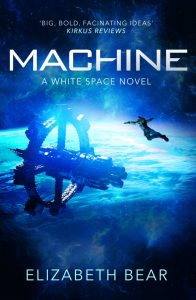 Yes I would. Machine is the story of a trauma doctor, a heavy rescue specialist, in the worst month of her life! She’s somebody who specializes in entering derelict spacecraft and attempting to rescue any survivors within them. At the beginning of the book, we join her and her ambulance ship crew as they are approaching an ancient generation ship that is massively off course, not responding to signals. It has somehow gotten itself docked to a modern ship that is also not responding to any signals, but has managed to send off the distress hail.
Yes I would. Machine is the story of a trauma doctor, a heavy rescue specialist, in the worst month of her life! She’s somebody who specializes in entering derelict spacecraft and attempting to rescue any survivors within them. At the beginning of the book, we join her and her ambulance ship crew as they are approaching an ancient generation ship that is massively off course, not responding to signals. It has somehow gotten itself docked to a modern ship that is also not responding to any signals, but has managed to send off the distress hail.
Over the course of the book, she unravels the mysteries of how that came to be. What happened to the crew of the generation ship? And what is going on in the current politics of the civilization and the hospital that she works for that links up with these deep historical mysteries? I’m trying not to spoil too much because it is a mystery plot. But there’s lots of aliens and space rescues.
Some of the setting of the book was inspired by the work of James White, who wrote the Hospital Station stories and books.
The space station hospital setting is a really interesting one, but it’s one that we don’t see that often in science fiction stories these days.
Yeah, I think it’s the idea of combining Hospital Drama and Space Station Drama. It’s definitely not original to me, but it does seem like it’s been an underutilized narrative device, shall we say, in science fiction. Especially when it provides so many interesting opportunities for things like first contact narratives. And also a non-militaristic view of the future, which is something we’re often very short of in space opera and hard science fiction. So I’m very pleased and excited to have gotten to play around with that kind of milieu.
One of the interesting things about this book and the previous one Ancestral Night, is that you’re exploring the space opera settings, but they’re very much in non-militaristic settings.
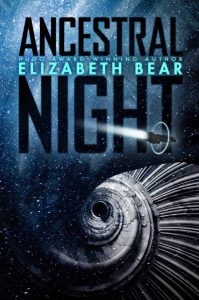 Yes. And C. J. Cherryh does some of that as well. She is another big inspiration for me with regard to these books in the world building. Specifically, all of the stuff she likes to play around with alien contact, and trade and negotiation and that sort of thing. Also, Andre Norton’s books that are basically space archaeology were a big, big inspiration for me.
Yes. And C. J. Cherryh does some of that as well. She is another big inspiration for me with regard to these books in the world building. Specifically, all of the stuff she likes to play around with alien contact, and trade and negotiation and that sort of thing. Also, Andre Norton’s books that are basically space archaeology were a big, big inspiration for me.
For me, one of the things that has always bothered me about science fiction and space opera, with the exception of a few notable writers like Ursula Le Guin, we seem to be unable to imagine any system of government for a far flung, multi species civilization that isn’t either galactic empire, space Republic, or massive mercantile trading company. It seems to me that government is a technology. It’s a technology that we have been as a species refining for tens of thousands of years. And the idea that we’re not going to continue to refine it and come up with better systems bothers me a lot, because I don’t think we’ve reached the end stage of good governance.
No most definitely not!
I definitely don’t think we’ve currently reached the end stage of good governance! And there’s actually a lot of research currently into different ways to make decisions, build consensus, crowdsourcing. As I was doing some of the deep background for these books, which would have been at a point back in 2013, 2014, when I was coming up with the ideas behind them. I was thinking a lot about how Iain Banks in the Culture books shuffles a lot of the decision making off to AIs. The idea is that they will do everything better, because they have more processing power.
But one of the things that’s interesting to me is how badly AI decision making can go wrong, which is a thing that gets explored a little bit in this book. If you give an AI a desired end state, it will find a way to get to that end state. It may take some shortcuts that human beings find unsurvivable or reprehensible. So I didn’t want to just be like, Oh, the AIs will fix everything. And I also had firmly in mind the idea that everybody’s utopia is somebody else’s dystopia. Which is why there’s so much in these books about people having different desired outcomes, or different ideas of what freedom means, or different paths of getting to where they are, or where they want to be. And that’s where much of the conflict in these narratives arises from because I didn’t want to write books about galactic wars or good guys, bad guys. Or even overthrowing the evil empire, which is probably the classic trope of space opera.
There’s a lot of that in Ancestral Night, particular in the conversations between the protagonist and the libertarian pirate character…
Gaslighting libertarian space pirates! Which I think it said in my character notes. I think many people in America have been having those conversations over the family dinner table over the last four years. Sorry, it all comes back to current politics. Ancestral Night definitely turned out to be a different book than it would have been had the 2016 election gone differently. I had to go back and scrap everything and start over.
Dr. Jens in Machine has a chronic pain condition. And that’s one of the things that mediates the way through which she interacts with the world around her. What was it like writing for a character with this condition?
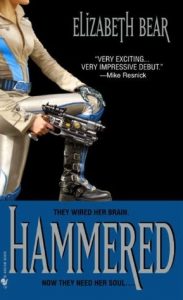 I have an autoimmune condition myself. So I do have a certain amount of chronic pain. It’s not as debilitating as Jens’ chronic pain. It occurred to me while I was writing this book that I have, throughout my career, actually tended to write a lot of characters with some sort of chronic pain disability. All the way back to my first published novel, Hammered, the protagonist of which is a military veteran with some long-term damage from her combat experience. This is the first time though that I’ve really been conscious of the fact that I was writing something like that out of my own experience.
I have an autoimmune condition myself. So I do have a certain amount of chronic pain. It’s not as debilitating as Jens’ chronic pain. It occurred to me while I was writing this book that I have, throughout my career, actually tended to write a lot of characters with some sort of chronic pain disability. All the way back to my first published novel, Hammered, the protagonist of which is a military veteran with some long-term damage from her combat experience. This is the first time though that I’ve really been conscious of the fact that I was writing something like that out of my own experience.
It’s odd how your brain compartmentalizes things.
This is very personal, but I think it’s because I had a really bad autoimmune flare starting in about the summer of 2015. That has really changed my ability to do a lot of things that I took for granted. We all process our trauma through our art. If you try not to do it, you’re just going to be writing very two-dimensional art. And so, it was in some ways cathartic. It was in some ways difficult and emotional. But also, I feel very strongly that there need to be narratives about marginalized people that do not center that marginalization. That there need to be narratives about queer people where the entire point of the narrative is not to problematize their queerness. And having grown up very rarely seeing somebody who I felt reflected me in the books that I was reading, I like to be able to widen the door to different kinds of protagonists.
I think the real strength of science fiction and fantasy right now, my generation of writers and the generation of writers that are right after us, is that we are very diverse in our backgrounds and outlooks. And that… that is making science fiction and fantasy a much wilder and more interesting place.
The books also feature the process of rightminding, where characters are able to exert control of their various internal functions. But there’s also the flipside that some people from outside or the AI’s can see that as well…
Yeah. Also, it can be used as a tool of social control, or domestic abuse. Not to put too fine a point on it. The idea of rightminding is one I’ve been playing with, off and on for probably ten or twelve years now in various different stories. The reason that came about is because we are in a place right now with our understanding of neurology, and neurodiversity, and mental illness, and ways in which to treat mental illness, that I think is analogous to where we were in 1950 in terms of treating physical illness and cardiac disease.
We are at the beginning of what I think will be a great leap forward in understanding how the human brain and emotion and thought processes and memory and so forth functions. And the level at which we are able to correct things that people used to just have to live with, like, depression and anxiety and bipolar disorder, and the list goes on. A friend of mine has a lapel button that says, “If it goes away when you remember to take your medication, it’s probably not a character defect.” Isn’t that wonderful?
Early in the 20th century, any idea of altering one’s natural mental state was seen as horrific. Everything from Brave New World to all of these mind control episodes of various science fiction TV shows in the 1960s. But the thing is that it turns out that our brains do a lot of maladaptive stuff. And that being able to repair that maladaptive stuff actually makes us happier and more functional human beings.
But the idea is that we might be able to fix other maladaptive stuff with our brains and therefore become better at surviving as a species and elevating everybody’s quality of life rather than screaming at each other on street corners, or being terrified that if anybody else gets a good thing then we won’t. Or deriving our self-worth from the idea that we’re better than somebody else. That being able to fix those things might be a way to also prevent a looming extinction event, which is, in the deep history of these books, what it took for people to be like, we’re killing ourselves. Maybe we better fix this before we all die.
There’s a lot of a lot of deep background in the books, either vaguely Buddhist or vaguely Hindu. It’s not so much derived from that, I’m not trying to write Hindu science fiction, I’m not qualified. But the idea of the evolution of philosophies and religions, and specifically philosophies that advocate for a more communal approach to life, as opposed to an individualistic approach to life might have some more influence on the society was at the back of my mind while I was building it.
You have various characters in these books who are cyborgs, which is something that has cropped up in quite a lot of your work, all the way back to the Jenny Casey books. Is the idea of human augmentation something that’s always fascinated you?
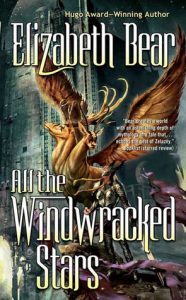 Well, I think most people would probably like to be superheroes! It’s not so much the idea of human augmentation that’s super fascinating to me. I came of age in the 1980s at the peak of cyberpunk, everything was cyberpunk. Science fiction was wall to wall cyberpunk. You walked into a random bookstore and picked up a random science fiction book, ten to one there with a guy with a metal face on the cover! (I may be exaggerating slightly.)
Well, I think most people would probably like to be superheroes! It’s not so much the idea of human augmentation that’s super fascinating to me. I came of age in the 1980s at the peak of cyberpunk, everything was cyberpunk. Science fiction was wall to wall cyberpunk. You walked into a random bookstore and picked up a random science fiction book, ten to one there with a guy with a metal face on the cover! (I may be exaggerating slightly.)
The thing is that because science fiction is always ten minutes in the future, we don’t realize how cybernetic we have become because we use it as replacement or augmentation for medical necessity. So, you have implanted hearing aids and pacemakers and artificial hips and artificial limbs and deep brain stimulation for intractable depression. We all walk around with a tiny little internet connection in our pocket all of the time and have outsourced everything. I don’t remember the last time I memorized a set of directions. Why would I do that? Or a phone number? I barely know my own phone number!
So we do kind of live a cybernetic lifestyle now. And I think that is only going to become more prevalent as time goes by. We’re looking at things like bicycle sharing apps and ride sharing apps. I don’t see why we can’t check lawn mowers out of the library if you need to mow your lawn. Everybody on the block doesn’t need to own a lawn mower. That’s ridiculous.
And that kind of connectivity feeds that kind of social change. So I think that we look at cyberpunk, and we think, ooh, this is edgy and sexy. And we look at what we’re actually doing right now. And we don’t think Ooh, this is edgy and sexy. But when I was a kid, the idea of somebody who had an amputated foot running a marathon was beyond the pale of human achievement, and now it’s mundane.
So I guess that’s my answer on cyberpunk. Because yes, I think we’re going to continue to use technology to fix stuff that goes wrong with our bodies. All the while thinking oh but the really sexy thing is over there. Also, I’m not putting anything designed by Elon Musk inside my skull!
No, that sounds like a disaster waiting to happen!
And so this book is book two in the White Space series. Can we expect more in the future?
I certainly hope so. We’re in negotiations currently. So magic eight ball says probably.
And just have to ask as a fellow cat lover. I love the cats in Ancestral Night.
Oh, thank you.
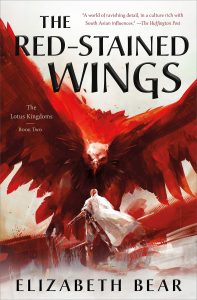 I presume that they’re based on your cats?
I presume that they’re based on your cats?
They are actually not. I guess they’re composite cats. I sadly never had a pair of annoying Calico sisters. We do currently have a tortoise shell cat. But she’s not very much like either of those. She’s a skittery little semi feral with strong opinions! I think most cats have strong opinions. Female cats in particular. Not to be gender essentialist about cats.
My previous cat was a gray female, and she was downright domineering. She was actually a little bit of a livejournal celebrity. I was living alone at the time, it was just me and the cat. Yeah. So I would write out the conversations that we had. She was known fondly as the presumptuous cat.
Finally, what are you working on at the moment?
I am currently working on a book that is about half a year overdue. Because planet wide catastrophe. It’s the final book in the Lotus Kingdom trilogy, which I’m finally getting some traction on. It kind of got stalled some time in the middle of May. And I finally managed to get back to it about a month ago, and now we’re making progress. I hope to have that finished by the end of the year. My apologies to the to the readers who are waiting for the dratted thing.
Thank you Elizabeth Bear for speaking with us!
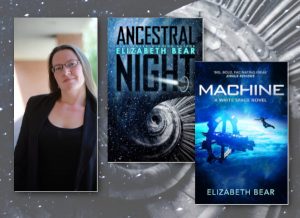

[…] (9) PAINSTAKING. Elizabeth Bear is interviewed about her new book, Ancestral Night, at Fantasy Hive. […]